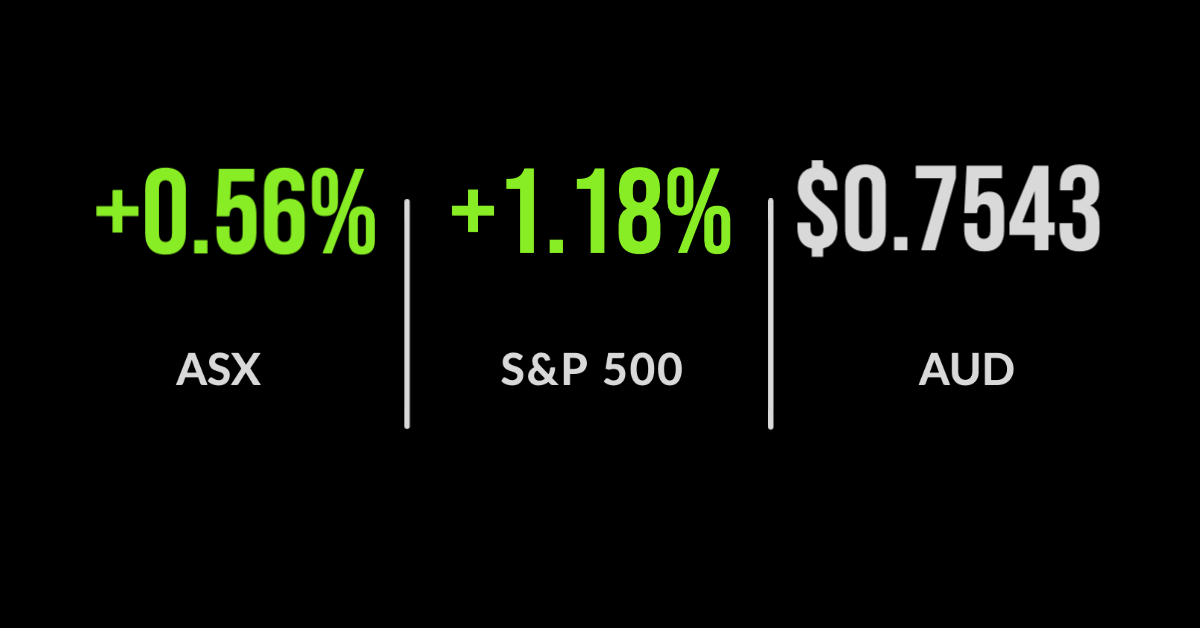ASX rose to six-week high ahead of Easter break
Second quarter off to strong start, AMP’s CEO departs, Boral announces buyback
The ASX200 (ASX:XJO) finished the week and commenced the new quarter on a strong note, finishing 0.5% higher with both IT, up 2.3%, and materials, 1.3%, contributing.
It was a day for stock specific news with the worst kept secret in finance being confirmed, AMP’s CEO Francesco de Ferrari is set to depart effective 1 July.
ANZ’s Deputy CEO Alexis George has now taken on the difficult task of rebuilding the group’s reputation at the same time that all its major asset is up for sale; shares finished 4.7% higher.
Boral Ltd (ASX:BLD) confirmed the completion of the sale of USG Boral for US$1.01 billion. Management announced their intention to undertake an on-market buyback in the coming months with the proceeds; the announcement sent shares 6.7% higher.
Webjet (ASX:WEB) was the underperformer, slumping 5.4% after they announced a $250 million debt raising in an effort to replace a pending loan maturity in 2022.
Macquarie (ASX:MQG) fell just 0.5% despite APRA forcing the group to hold an additional $500 million in capital due to ‘historical breaches’ that related to capital funding across their various business units.
The Commonwealth Bank (ASX:CBA) was also hit with proceedings as ASIC alleged the overcharging of $55 million in fees over a decade, impacting some 969k customers including pensioners.
US strength continues, bond yields fall, oil supply recovery to be slow
US markets finished the week on a similarly strong footing, with the Nasdaq adding 1.8%, leading the S&P500, 1.2%, and Dow Jones, 0.5%, with lower bond yields supporting higher company valuations.
Over the week, it was the Nasdaq once again asserting its dominance jumping 3.8% compared to the S&P500 which added 2.8%.
Cathie Wood’s ARK Invest group finally launched their Space oriented ETF, with the fund attracting over US$1 billion in investments in its first day of trading.
On the flip side, the London IPO of Uber competitor Deliveroo was derided as the ‘worst IPO in UK history’, falling 26% on debut placing questions over the bourse’s ability to attract popular technology companies in future years.
OPEC agreed to only slowly boost output which will ensure any impending falls in the oil price aren’t significant, supporting continued profitability in the short term, but once again confirming where the power lies in global energy markets.
Earnings estimates for S&P500 companies increased 6% in March, the strongest rate since 2002 as investors become increasingly confident about the economic recovery.
Frothy markets, executive pay in focus, property on fire
Is Deliveroo the so-called ‘canary in the coal mine’ for the booming IPO sector? Attending a conference this week one speaker highlighted the growing risk and falling quality of many IPOs coming to market in the current environment.
Low cash rates are forcing investors to seek additional returns wherever possible, with IPO oversubscriptions a clear beneficiary.
The speaker went a step further suggesting several companies seeking to list may not survive the next few years as the economic recovery wavers.
With talk of growing inequality as large businesses benefitted from the pandemic, leaving thousands unemployed and small businesses to fail, this week’s executive pay announcements are unlikely to help close the gap.
Larry Fink, CEO of index manager BlackRock saw an 18% pay rise to US$29 million after a strong year.
In Australia, the new AMP CEO will receive a $1.7 million salary along with a $4 million signing bonus as she commits to turning around the business.
Finally, all eyes are on the property market, with the same experts predicting a 30% fall in 2020 now calling for a 15% increase in 2021.
Low rates and a fear of missing out are combining with a lack of supply to move prices into bubble territory.
There is little doubt that macroprudential measures will be used in 2021 before it moves out of control ahead of a likely increase in borrowing rates.







